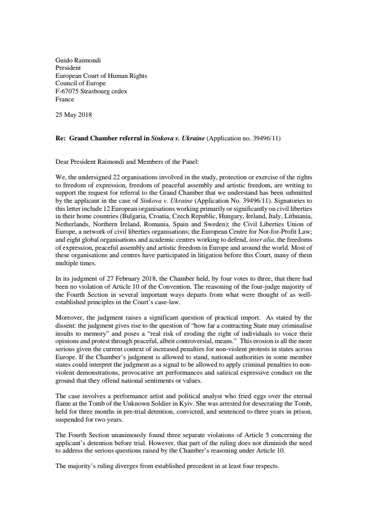Girleanu v. Romania
Protecting the Right of Journalists to Possess Classified Information
In 2005, a Romanian journalist received confidential information related to national security. He neither published the information nor returned it to the security authorities when they requested it. Months after the leak, as part of the investigation, the journalist was temporarily detained, charged, and later fined. The European Court of Human Rights is considering whether the detention and penalty constitutes a violation of the journalist’s freedom of expression.
Facts
In July 2005, Marian Gîrleanu, then a journalist for the national daily România Liberă, received confidential information concerning international involvement in the Iraq and Afghanistan wars. He shared it apparently with a few other journalists, and within days informed the Romanian Intelligence Service, but never published the information.
Six months later, on February 16, 2006, authorities arrested Gîrleanu. The Department for Investigating Organised Crime and Terrorism Offenses (DIOCT) within the General Prosecutors’ Office charged him with collecting and transmitting secret information in violation of Article 19 of Romania’s Act No. 51/1991 on national security.
Article 19 of Romania’s Act No. 51/1991 on national security provides that the actual or attempted “collecting and transfer of information of a secret or confidential nature, by any means, outside of the legal framework” constitutes a criminal offense punishable by two to seven years imprisonment. Romania’s 2002 Law on Classification identifies public servants as the only parties responsible for the protection of classified information. However, neither Act No. 51/1991 on national security nor Romania’s criminal code make any distinction between public servants and private persons, including journalists and other public watchdogs, in their provision of criminal sanctions for unauthorized possession or disclosure of information.
A judge initially remanded Gîrleanu to custody for 10 days, but the Supreme Court ordered his release on February 18, 2006. On September 26, 2007, prosecutors discontinued the investigation but imposed a fine of 186 euros.
Gîrleanu unsuccessfuly challenged the prosecutorial sanction before the Prosecutor General, the Court of Appeals, and the Supreme Court. The Court of Appeals found that Gîrleanu possessed the information not in his professional capacity, refused to return it, and disclosed it to others without authorization. At least six other journalists were reportedly arrested around the same time as part of a related investigation into the leak.
Gîrleanu subsequently filed a challenge before the European Court of Human Rights.
Open Society Justice Initiative Involvement
The Open Society Justice Initiative and the International Commission of Jurists jointly filed a third-party intervention.
Arguments
Chilling Effect of Restrictions. Restrictions on the journalist’s right to possess or disclose information related to national security undermine the journalist’s ability to exercise her professional obligations, and threaten the public’s ability to exercise effective oversight of policymaking related to national security. Such restrictions may chill the journalist’s amenability to receiving or disclosing information, and a source’s willingness to provide it.
Journalists may not be sanctioned for the disclosure of governmental information absent exceptional circumstances. Journalists and other similarly protected persons may not be sanctioned for the disclosure in the public interest of government information, including classified information, if acting in good faith. They may only be sanctioned if they have committed a crime not predicated upon the mere possession or disclosure of information.
Governments may not restrict possession of information by journalists. The possession of government information by journalists and other similarly protected persons is protected from government restriction at least to the same extent that disclosure would be so protected. Consistent with their professional responsibilities, journalists must be permitted to retain information, even if it is not deemed in the public interest or ultimately disclosed.
Even minor or threatened penalties can have chilling effects on freedom of expression.
Open Society Justice Initiative and International Commission of Jurists file third-party intervention. Guardian News and Media also filed a third-party intervention.
Gîrleanu files challenge before European Court of Human Rights. Relying on Article 10 of the European Convention, Girleanu complains that his arrest and order to pay a fine constitutes an infringement of his freedom of expression.
The highest court of appeal (Haute Cour de Cassation et de justice) rejects an appeal.
Court of Appeal of Bucharest dismiss complaint as unfounded on account of the fact that Gîrleanu did possess the information, refused to return it to the authorities, and disclosed it to others without authorization (other journalists) and out of his professional capacity.
Prosecutors discontinue investigation but impose a fine of 186 euros.
Supreme Court orders Gîrleanu’s release.
Authorities arrest Gîrleanu and charge him with collecting and transmitting secret information.
Journalist Marian Gîrleanu receives confidential information concerning international involvement in the Iraq and Afghanistan wars.
Related Work
Joint Letter: Support for ECHR Grand Chamber Referral in Sinkova v. Ukraine
A joint letter from 22 organizations supporting freedom of expression, sent to support a Grand Chamber review of the ECHR’s Sinkova v. Ukraine ruling.

Joint Letter: Support for ECHR Grand Chamber Referral in Sinkova v. Ukraine
A joint letter from 22 organizations supporting freedom of expression, sent to support a Grand Chamber review of the ECHR’s Sinkova v. Ukraine ruling.

Why Breaking the Silence Needs the Right to Keep Silent
An Israeli rights group used testimony from soldiers to bring to light abuses in Gaza and the occupied West Bank; now it is under legal pressure to expose its sources.